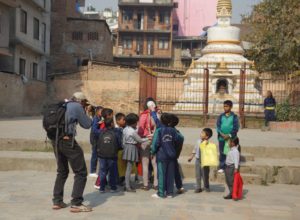We are excited to share an excellent new post on Public Seminar written by one of our former ICI staff and recent New School for Social Research PhD graduate, Marina Kaneti. In her piece Kaneti reflects on a trip to Kathmandu, Nepal earlier this year and her interactions with noted Nepali performance artist Ashmina Ranjit. It is a fascinating read, and includes some nice visuals of the skeleton performance by Ranjit in Nepal and NYC and reflections on what Kaneti describes as “alternative democratic spaces” in theory and practice.

Here is an excerpt of Kaneti’s Walking With Disaster:
In a summer filled with news of the election in the United States, global terrorism, and Brexit, the swift resignation on July 24th of Nepal’s Prime Minister, Khadga Prasad Sharma Oli, hardly made the headlines. The only two news sources reporting on the event outside of Asia — Al Jazeera and the New York Times — also produced somewhat dissimilar commentaries. The New York Times framed the resignation in the context of party politics, the challenges of running a multi-coalitional government, growing demands for federation, and geopolitical tensions with Nepal’s powerful neighbors, India and China. The Al Jazeera report also associated the resignation with demands for constitutional reforms and federalization, but the commentary largely focused on the numerous street protests that had been disrupting daily life in Kathmandu since Oli’s ascent to power in October 2015.
It is very probable that Oli’s resignation was triggered by multiple factors, and the two media commentaries are not mutually exclusive. Yet what is unique in Al Jazeera’s reporting is that it underscores the extent to which the streets of Kathmandu are seen as the space to congregate, express political opinions, and — in the words of activists themselves — to exercise democracy. Al Jazeera’s coverage of Nepal is also a reminder that in the case of people who are left voiceless or marginalized by constitutional clauses, political processes, or social stigma, democracy is only possible in alternative spaces — such as the streets — where new forms of political engagement emerge, claims for social justice can be made, and popular pressure can trigger reform.
During a March 2016 visit to Kathmandu with the India China Institute, I had the chance to observe such use of alternative democratic spaces in the “artivist” performances of Ashmina Ranjit, a leading artist and political activist in Nepal. Like many others, Ashmina has been a vociferous critic of the 2015 constitution, and specifically of its failure to uphold the rights and freedoms of women and children. According to the current legislation, the state does not grant citizenship rights to children born out of wedlock and to children born to men who are not Nepalese nationals. Somewhere in between the jus soli and jus sanguinis, the constitution essentially chartered a different version of citizenship rights: as mediated through marriage and the nationality of the male parent. “Jus matrimonium et masculum,” as this retrograde constitutional provision/citizenship law could be called, appears to completely disregard the legal, social and political status of the mother, making her all but a non-entity. Even worse, children born out of wedlock would appear to be non-existent, relegated to statelessness before they are even born.
You can read the whole piece online at Public Seminar here.
